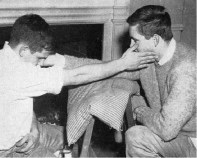1922 Noting a trend among American universities toward improving the quality of student dormitories, the editors remark, "The average undergraduate, in fact, is better housed during his college course than he is likely to be when left to shift for himself after graduation."
1927 After conducting physical examinations of the 916 freshmen, Oliver professor of hygiene Alfred Worcester reports that "smoking is a habit with 294 freshmen, 11 are color blind, 91 cannot swim, 297 wear glasses, 77 have lost their appendixes, 21 their adenoids, and 32 have never been vaccinated."
1932 Professor Robert P. Blake, director of the University Library, reports that Harvard's collection is the fifth largest in the world, the third largest in the country, and the biggest university library in the United States.
1937 Dean of the Divinity School Willard L. Sperry reports that attendance at Memorial Church's morning prayers has dropped drastically with the recent move of undergraduates to the Houses. Bulletin editors note, "It was just fifty years ago that Harvard abandoned the rule requiring attendance at morning prayers. Probably very few of those who then objected to the change would go back to the old order even if they could."
1942 As World War II shrinks student numbers and flexibility, Harvard shifts to a year-round schedule, adding a 12-week summer term. New courses reflect "Opportunities for Special Training during the War," including History 33b: "The Development of Modern Armies" and Fine Arts 1x: "Camouflage--Protective Concealment." The Faculty of Arts and Sciences votes to allow all undergraduates, including freshmen, to live in the Houses to increase campus unity.
1947 On January 7, 300 men gather in a new glass-and-brick building north of Pierce Hall for the official opening of the University's Computation Laboratory.
Despite its reputation as a "rich man's college," the Bulletin notes that Harvard is actually a bargain among prestigious colleges in the Northeast: a total cost of $494 a semester, compared to $502.50 at Princeton, $524.50 at Williams, $544.50 at Columbia, and $650 at Yale.
 1952 After reading in Ripley's Believe or Not about two Russians who allegedly slapped each other every 10 seconds for 72 hours, Oakleigh Thorne '54 (left) and Richard Mortimer '54 decide to challenge that record. With a $128 wager hanging in the balance, the Leverett residents go at it for 48 hours, exchanging 4,320 "light, pat-like slaps." Major newspapers, including the New York Times, mistakenly report that the undergraduates had beaten the Russians' record, demonstrating "the superiority of Americanism and free enterprise."
1952 After reading in Ripley's Believe or Not about two Russians who allegedly slapped each other every 10 seconds for 72 hours, Oakleigh Thorne '54 (left) and Richard Mortimer '54 decide to challenge that record. With a $128 wager hanging in the balance, the Leverett residents go at it for 48 hours, exchanging 4,320 "light, pat-like slaps." Major newspapers, including the New York Times, mistakenly report that the undergraduates had beaten the Russians' record, demonstrating "the superiority of Americanism and free enterprise."
1957 The College extends upperclassmen's Saturday-night curfew to midnight and freshmen's curfew to 8 p.m.
1967 Lamont Library staff members decide it has enough room to allow Radcliffe's 1,200 undergraduates and 650 graduate students to study there on a trial basis, now that the new women's library is located farther from the Yard.
As a result of their letter-writing campaign against escalating U.S. involvement in Vietnam, several undergraduates are invited to meet with Secretary of State Dean Rusk. Meanwhile biology professors John T. Edsall and Matthew S. Meselson send a letter, signed by 5,000 scientists, to President Lyndon Johnson, asking him to refrain from using chemical-biological weapons in the conflict.
1972 WHRB offers "an orgy of death, suffering, and the apocalypse": works include Beethoven's Piano Sonata No. 12, "Funeral March," Demantius's Prophecy of Suffering and Death of Jesus Christ, and Shubert's String Quartet No. 14 in D, "Death and the Maiden."
1977 CBS reporter Dan Rather tells Law School students dreaming of "a boat, two cars, and working for fat-cat corporations," "If you don't get out and rock the boat you'll be prostituting a very high trust, and I'll be damned disappointed."





